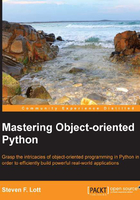
Faulty factory design and the vague else clause
Note the structure of the if statement in the card() function. We did not use a catch-all else clause to do any processing; we merely raised an exception. The use of a catch-all else clause is subject to a tiny scrap of debate.
On the one hand, it can be argued that the condition that belongs on an else clause should never be left unstated because it may hide subtle design errors. On the other hand, some else clause conditions are truly obvious.
It's important to avoid the vague else clause.
Consider the following variant on this factory function definition:
def card2( rank, suit ):
if rank == 1: return AceCard( 'A', suit )
elif 2 <= rank < 11: return NumberCard( str(rank), suit )
else:
name = { 11: 'J', 12: 'Q', 13: 'K' }[rank]
return FaceCard( name, suit )
The following is what will happen when we try to build a deck:
deck2 = [card2(rank, suit) for rank in range(13) for suit in (Club, Diamond, Heart, Spade)]
Does it work? What if the if conditions were more complex?
Some programmers can understand this if statement at a glance. Others will struggle to determine if all of the cases are properly exclusive.
For advanced Python programming, we should not leave it to the reader to deduce the conditions that apply to an else clause. Either the condition should be obvious to the newest of n00bz, or it should be explicit.